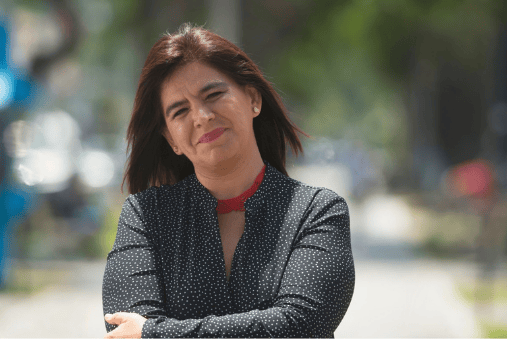ROME – One of America’s leading journalistic watchdog groups has condemned a court order to open the phone records of a Peruvian investigative journalist whose reporting has revealed scandals inside a Peru-based Catholic order.
In a statement earlier this month, the Committee to Protect Journalists (CPJ) called on the Peruvian Prosecutor’s Office “to immediately close the illicit enrichment case against investigative journalist Paola Ugaz and reverse its order to her phone company to disclose her phone records and geolocation data from 2013 to 2020.”
Paola Ugaz alongside fellow journalist Pedro Salinas for years has investigated physical, psychological, and sexual abuses within the Sodalitium Christianae Vitae (SCV), founded in 1971 by Peruvian layman Luis Fernando Figari.
Together Ugaz and Salinas, himself a former member of the SCV, in 2015 published a book Half Monks, Half Soldiers detailing decades of rampant abuse within the SCV, prompting a series of Vatican-led investigations, including Pope Francis’s appointment last year of a “Special Mission” to inquire into ongoing allegations of abuse and financial corruption.
As a result of that inquiry – conducted by Maltese Archbishop Charles Scicluna, an adjunct secretary to the Dicastery for the Doctrine of the Faith (DDF), and Spanish Monsignor Jordi Bertomeu, an official in the same department – the Vatican in recent weeks has expelled Figari and 10 other top-ranking members.
RELATED: Denver parish at heart of scandals involving Peru-based lay group
CPJ Latin America Program Coordinator Cristina Zahar said in their statement that the organization is “really concerned by the years of judicial harassment that Paola Ugáz has endured since she and Pedro Salinas started investigating a religious organization in Peru in 2010.”
“Revoking the confidentiality of her communications is illegal under Peru’s constitution, as it could expose her journalistic sources and personal details, but it could also lead to reprisals against her,” she said.
Ugaz, who has continued to investigate the SCV’s finances for the past decade, for years has faced an onslaught of criminal defamation suits and other legal complaints from individuals and organizations with ties to the SCV.
(In the Peruvian system, it doesn’t require a District Attorney to file a criminal complaint for certain offenses, including defamation; one can be registered by a private citizen.)
Efforts have been made by Peruvian politicians – including congressman Alberto de Belaunde, who led a government commission investigating institutional cases of abuse, including the SCV – to decriminalize crimes against one’s personal honor, meaning defamation cases would be tried in civil rather than criminal courts, yet no progress on that front has been made.
In 2021 a man with ties to the SCV named Luciano Revoredo, director of conservative website La Abeja who has repeatedly criticized Ugaz and her work, brought forward a complaint of money laundering against Ugaz that was dismissed last October due to a lack of evidence.
However, Revoredo also filed a criminal complaint in April of 2023 of illicit enrichment against Ugaz that was initiated by Patricia Benavides, Peru’s Attorney General, and which included measures seeking access to Ugaz’s phone calls and messages.
At the time, the move was condemned by advocacy and watchdog groups as a violation of the freedom of the press that could put the confidentiality of information shared by sources at risk.
According to Ugaz’s attorney, Carlos Rivera, the same information used in the 2021 complaint for money laundering was also used in last year’s illicit enrichment suit.
Speaking to CPJ, Rivera said the 8-month deadline for the investigation by the prosecutor’s office expired in January 2024, so they appealed to a local court to have the process closed. The judge, he said, accepted the request and ordered the closure of the investigation.
However, Rivera said Revoredo’s legal team appealed that decision and additionally asked that the court lift the secrecy on Ugaz’s communications based on a resolution from August 2023 that his team had been unaware of.
“This really shocked us because we weren’t aware of it,” he said, saying that after the court then reversed its order to close the investigation and ordered Ugaz’s phone company to turn over her phone records, they issued an appeal.
Rivera said this appeal was filed on Sept. 26, and that this marks the first time that Peruvian authorities have ordered that a journalist’s communications be revealed, setting what could be a serious threat to the freedom of the press and to investigative journalism.
“It is a tragedy to be the first Peruvian journalist to have their communications lifted with legal tricks, a treatment reserved for criminals,” Rivera said.
Ugaz in addition to this case is also battling several other legal complaints while continuing to report on financial scandals within the SCV and the Vatican’s investigation of the group.
Watchdog group Reporters without Borders has also condemned what it has called the legal harassment of Ugaz over her reporting on the SCV, saying that over the past two years, Peru has seen “a sharp decline in freedom of information.”
The group said it has documented 20 violations of freedom of the press, “many of them involving public officials attacking media professionals,” with Ugaz’s case being among the most notorious.
Follow Elise Ann Allen on X: @eliseannallen














